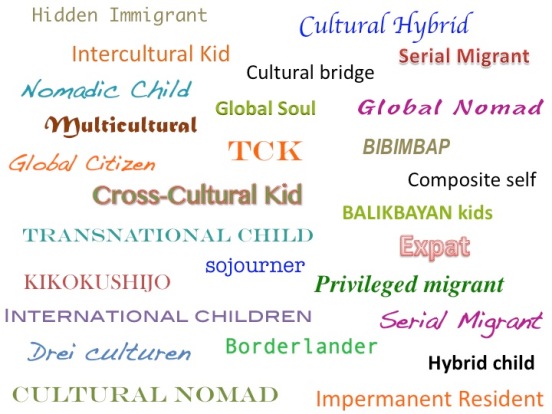“No generation before now has had so many of its members simultaneously living in, between, and among countless cultural worlds as is happening today.” Lois Bushong (2013)

The Cross Cultural Kid
“A Cross Cultural Kid (CCK) is a person who is living/has lived in – or meaningfully interacted with – two or more cultural environments for a significant period of time during the first eighteen years of life.” Ruth van Reken 2017

At the 2017 Families in Global Transition Conference (FIGT) in The Hague, Netherlands, Ruth van Reken elaborated on the term Cross Cultural Kid. Children are often in more than one of these circles at the same time. (e.g. A traditional TCK who is also from a minority group; a child of immigrants whose parents are from two different cultures, etc.) This helps us understand the growing complexity of the issues we face in our changing world . The term Cross Cultural Kid is the umbrella name for many variations of CCKs including:
Domestic Cross Cultural Kid
A child “whose parents have moved in and among various subcultures within that child’s home country.” (Pollock & Van Reken, 2009) This may be from the rural subculture to the city, from the subculture in one city to the subculture on the other side of that city, from a Capital city’s subculture to the subculture of another Capital city or from one State to another. Domestic TCKs are moving across cultures, they just happen to be within one country’s border.
Educational Cross Cultural Kid
A child who moves between educational cultures such as from the eastern educational culture to the western educational culture or vice versa. In this category I also include students moving from living at home and attending the local school to living in the school boarding house and experiencing a new educational culture.
Bi/Multi-cultural or Bi/Multi-racial Children
Children born to parents from at least two cultures or races.
Children of Borderlanders
Children living on or near the border between two countries, perhaps living in one country and going to school in another country.
Children of Immigrants
Children whose parents have made a permanent move to a new country where they were not originally citizens.
Children of Minorities
Children whose parents are from a racial or ethnic group which is not part of the majority race or ethnicity of the country in which they live.
Children of Refugees
Children whose parents are living outside their original country or place due to unchosen circumstances such as war, violence, famine, other natural disasters
International Adoptees
Children adopted by parents from another country other than the one of that child’s birth
Traditional Third Culture Kids
Have you heard the term “Third Culture Kids?” What is a Third Culture Kid (TCK)? Before we can answer that question we need to ask “what is the Third Culture?” which therefore, creates the obvious question of what are the first and second cultures?
The First Culture:
Usually the home or passport culture (more often the same as the parents’ but not always)
The Second Culture:
All the places a child has lived
The Third Culture:
The shared lifestyle of the expatriate community. As early as the 1950s Social Scientists Drs John & Ruth Hill-Useem observed that expatriates – people who had moved overseas for their career (as opposed to immigrants) – preferred to spend time with other expats even though they were from different cultures and countries. Continuing in the 21st Century, expatriates (also known as expats) form a lifestyle that is different from the host or home culture but common to them all in that particular setting. In the Third Culture, the sense of belonging comes from the commonality of the expats’ internationally mobile experiences despite the differences in nationality, cultural heritage or ethnicity.
The Third Culture Kid
“A person who has spent a significant part of his or her first eighteen years of life accompanying parents into a country outside either/both parents’ passport country(ries) due to the parent’s choice of work or advanced training.” Ruth van Reken 2017
Since Pollock developed the the original TCK definition in 1986, others have added terms to define the TCK. These are often used interchangeably. Some common terms include:
Global Nomads
“Anyone raised abroad because of their parents’ career choice.” Norma McCaig (2008)
Global Soul
“A person who had grown up in many cultures all at once – and so lived in the cracks between them.” Pico Iyer (2000)
Globally Mobile Kid
This is a term I have previously adopted to cover all of the above definitions. Whether the developmental years were spent in the same house, on the same street & in the same suburb; moving from subculture to subculture within the same country or moving from one country to another, each child has their own unique growing up experience. In the same way, the Globally Mobile Kid no longer fits into one definition as there are so many variances of the mobile lifestyle in the 21st Century. Each is writing their own unique life story so I have used the term Globally Mobile Kid to acknowledge and embrace all those stories and all those individuals.
I love learning and having sat under the tutelage of Ruth van Reken at the FIGT Conference 2017, I will now be using the term Cross Cultural Kid as the umbrella term for all the above definitions.
To fully understand Cross Cultural Kids, I highly recommend you begin by reading Third Culture Kids: Growing Up Among Worlds by David Pollock, Ruth Van Reken and Michael Pollock (2017) and visit Ruth van Reken’s Cross Cultural Kids website. See my CCK Resources page for more recommendations.
Our knowledge and understanding of CCKs and the globally mobile lifestyle is developing daily thanks to some excellent research. To grasp the journey so far, please read about some of the Pioneers of the TCK and CCK phenomenon on Paul Asbury Seaman’s website.

7 thoughts on “Cross Cultural Kids”